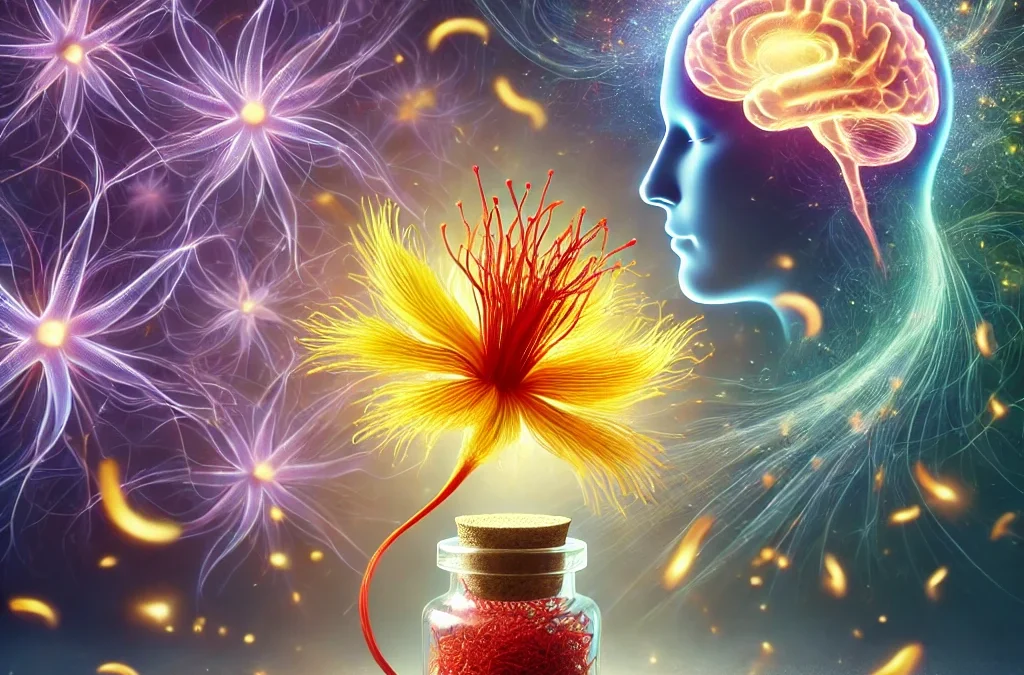Affron® (the only patented saffron extract for mood and stress) is a standardized extract derived from the stigma of saffron (Crocus sativus). It has gained attention for its potential health benefits, particularly mental and emotional well-being. Rich in bioactive compounds like crocin, crocetin, and safranal, it offers a natural approach to enhancing mood, supporting cognitive function, and improving overall quality of life. Below, we explore the scientifically backed benefits of this golden supplement.
Mood Enhancement
One of the most well-researched benefits of affron® is its positive impact on mood and stress. Five published clinical studies have examined affron® and its effects on anxiety, mood, and tension, including one specifically done with adolescents.
Affron® Studies show:
- Alleviating occasional stress, frustration, and tension in adults[i]
- Helped children (12-16 years of age) maintain a positive mood and alleviate occasional stress, frustration, and tension.[ii]
- Improve psychological symptoms (low mood and occasional stress) in perimenopausal women (32-33% reduction)[iii]
In short, affron® supplementation significantly reduced stress and mood levels in adults. Participants reported feeling less stressed and relaxed.
Impact on Brain Health: Mechanisms of Action
Emerging research suggests that affron® may support the brain in multiple ways, eventually showing cognitive function benefits, particularly in enhancing memory and learning. The following brain health mechanisms have been identified:
- Reduction in ROS[iv][v]
- Increase Neuronal Plasticity
- Increase BDNF Expression[vi]
- Promotes Neurotransmitter Balance
Sleep Quality Improvement
Poor sleep is a common issue that can significantly impact overall health and well-being. Affron® has been shown to improve sleep quality, making it easier for individuals to fall and stay asleep.
Three studies with affron® show its impact on occasional sleeplessness, improved sleep quality, and enhanced restorative sleep.[xi] [xii] [xiii] One study demonstrated that individuals who took affron® experienced better sleep quality and felt refreshed upon waking.[xiv] This improvement in sleep was linked to affron®’s ability to reduce stress and promote relaxation, which is essential for restful sleep.
Affron® is a promising natural supplement with various health benefits, from mood enhancement to brain health and improved sleep quality. Scientific research supports its use as a safe and effective alternative to conventional treatments for depression, anxiety, and other mental health issues. By including affron® in your wellness regimen, you may experience better mental and emotional health and a boost in overall well-being.
References
[i] Kell G, Rao A, Beccaria G, Clayton P, Inarejos-García AM, Prodanov M. affron® a novel saffron extract (Crocus sativus L.) improves mood in healthy adults over four weeks in a double-blind, parallel, randomized, placebo-controlled clinical trial. Complement Ther Med. 2017 Aug;33:58-64. doi: 10.1016/j.ctim.2017.06.001. Epub 2017 Jun 13. PMID: 28735826.
[ii] Lopresti AL, Drummond PD, Inarejos-García AM, Prodanov M. affron®, a standardized extract from saffron (Crocus sativus L.) for the treatment of youth anxiety and depressive symptoms: A randomised, double-blind, placebo-controlled study. J Affect Disord. 2018 May;232:349-357. doi: 10.1016/j.jad.2018.02.070. Epub 2018 Feb 26. PMID: 29510352.
[iii] Lopresti AL, Smith SJ. The Effects of a Saffron Extract (affron®) on Menopausal Symptoms in Women during Perimenopause: A Randomised, Double-Blind, Placebo-Controlled Study. J Menopausal Med. 2021;27:e8. https://doi.org/10.6118/jmm.21002
[iv] . Zhang, C. et al. Tissue and Cell 47.3 (2015): 291-300.;
[v] Baluchnejadmojarad, T. et al. Metabolic brain disease 34.6 (2019): 1747-1759
[vi] . Ghasemi, T., et al. Drug research 65.07 (2015): 337-343
[vii] Hosseinzadeh H. Et al. Phytother Res. (2009) Jun;23(6):768-74;
[viii] . Georgiadou, G et al. Neuroscience letters vol. 528,1 (2012): 27-30
[ix] Pitsikas, N. et al. Molecules. 2020 Nov 30;25(23):5647
[x] Hosseinzadeh H, et al. Phytomedicine. 2007 Apr;14(4):256-62
[xi] Nishide, A, et al. Japanese Pharmacology and Therapeutics. 2018 (8); 46:1407-1415
[xii] Lopresti AL, et al. J Clin Sleep Med. 2020
[xiii] Lopresti AL, et al. Sleep Medicine 86 (2021) 7-18
[xiv] Lopresti A. et al, J Clin Sleep Med, 2020 Feb 14.


